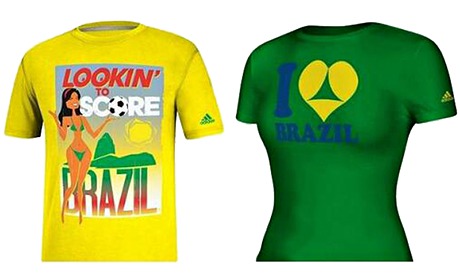Sportswear maker to stop selling T-shirts before World Cup after Brazil’s ministry of women’s affairs said shirts were offensive

T-shirts withdrawn by Adidas for the Brazil World Cup Photograph: Adidas
Adidas agreed on Tuesday to stop selling two raunchy T-shirts months ahead of the World Cup in Brazil after the government complained that they associated the country with sexual tourism.
One shirt shows a bikini-clad woman with open arms on a sunny Rio de Janeiro beach under the words “Looking to Score”. The other has an “I love Brazil” heart resembling the upside-down buttocks of a woman wearing a thong bikini bottom.
Adidas – the world’s second-largest sportswear maker – said the shirts would not be sold any more, adding in a statement that they were from a limited edition that was only on sale in the US
The shirt designs touched a nerve in Brazil, where people often complain about foreign stereotypes of Brazilian sensuality. Brazil’s government is campaigning aggressively to shed the country’s reputation as a destination for sex tourism.
“Embratur strongly repudiates the sale of products that link Brazil’s image to sexual appeal,” the Brazilian tourism board said in a statement that asked the German multinational to pull the shirts from its stores.
The shirts went on sale in Adidas shops in the US while Brazil is preparing to host the World Cup soccer tournament, which kicks off on 12 June.
Adidas is one of the main sponsors of the event organised by soccer’s governing body, Fifa, and the maker of its official ball.
Dilma Rousseff – Brazil’s first female president – said her government would crack down on sex tourism and the exploitation of children and adolescents during the ccompetition, which is expected to draw 600,000 foreign fans.
“Brazil is happy to receive tourists for the World Cup, but it is also ready to combat sex tourism,” she said in a burst of Twitter messages that included a hotline number to report cases of sexual exploitation.
The ministry of women’s affairs said the shirts were not just offensive to Brazilian women but exposed them to the “barbarism” of sexual predators.
“This is all the more shocking in a country that just elected a women as its highest authority, which brought greater respect for women and zero tolerance for any form of violence against them,” a ministry statement said.
